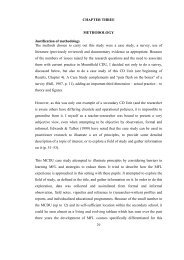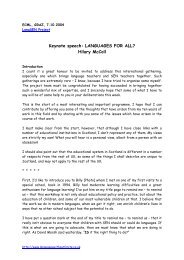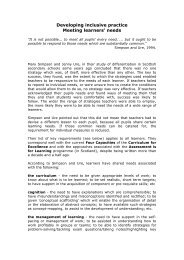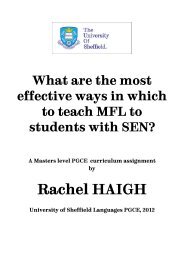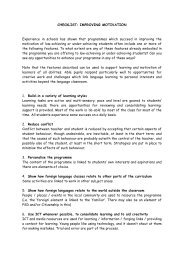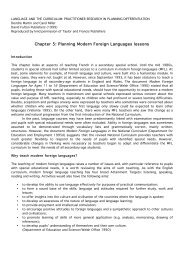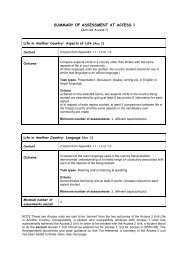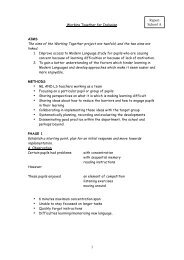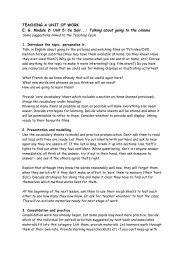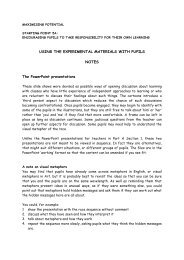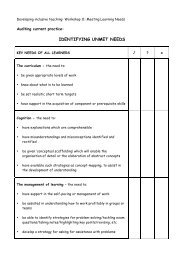The early learning of English as a foreign language by hearing ...
The early learning of English as a foreign language by hearing ...
The early learning of English as a foreign language by hearing ...
You also want an ePaper? Increase the reach of your titles
YUMPU automatically turns print PDFs into web optimized ePapers that Google loves.
10Discussion<strong>The</strong> results show that the curriculum modifications provide teachers with support whenplanning and organising <strong>English</strong> lessons that can foster interest in another culture.Nevertheless, there are <strong>hearing</strong>-impaired children who cannot benefit from the course,depending on the extent <strong>of</strong> their <strong>hearing</strong> loss. <strong>The</strong> states are not sufficiently taking intoaccount those students’ unique conditions.This situation applies to both forms <strong>of</strong> schooling; the <strong>hearing</strong> impaired support centres <strong>as</strong>well <strong>as</strong> a form <strong>of</strong> integration schooling. As <strong>hearing</strong>-impaired students usually follow the samecurricular programme <strong>as</strong> their <strong>hearing</strong> fellow pupils, amendments and modifications for the<strong>early</strong> <strong>learning</strong> <strong>of</strong> <strong>English</strong> must include integrated settings <strong>as</strong> well. Achieving successfulintegration requires a psychologically felt inclusion <strong>as</strong> well <strong>as</strong> an integration b<strong>as</strong>ed on themotivation to achieve. This presumes a provision for communicational needs. <strong>The</strong> Viennapilot school “Waldschule” <strong>of</strong>fers tuition in oral and sign <strong>language</strong> for <strong>hearing</strong> and <strong>hearing</strong>impairedchildren and takes the communication situation in a regular primary school one stepfurther towards inclusion and therefore towards successful motivation to achieve (Kramreiter2008, 131ff.).In North Rhine-Westphalia, deaf children and <strong>hearing</strong>-impaired children with multipledisabilities whose communication is b<strong>as</strong>ed on sign <strong>language</strong> receive lessons in German SignLanguage instead <strong>of</strong> <strong>English</strong>. In Bavaria children who communicate with sign <strong>language</strong> aretaught the American sign <strong>language</strong>. <strong>The</strong> modifications in Baden-Württemberg supply<strong>hearing</strong>-impaired children who show different communicational needs with the samecurriculum. This raises the question <strong>of</strong> children’s rights to an equal education including theirchosen means <strong>of</strong> communication to <strong>as</strong>sure equal future options for personal andemployment development. Ultimately, this issue does not only concern the choice <strong>of</strong> sign<strong>language</strong> or spoken <strong>language</strong>. <strong>The</strong> different <strong>learning</strong> and <strong>hearing</strong> needs <strong>of</strong> individualstudents have to be considered in the planning and organising <strong>of</strong> <strong>English</strong> lessons.We must explore alternative ways <strong>of</strong> <strong>learning</strong> a <strong>foreign</strong> <strong>language</strong> for children with an auditoryimpairment. To b<strong>as</strong>e a modification for <strong>hearing</strong>-impaired children on the regular primaryscheme <strong>of</strong> work, which places the focus on the ability to hear and to speak, iscounterproductive.Positive experiences with alternative <strong>learning</strong> designs have been developed at secondaryand university level for students with special educational needs <strong>learning</strong> a <strong>foreign</strong> <strong>language</strong>.This h<strong>as</strong> been illustrated <strong>by</strong> both, the Universal Design for Learning <strong>as</strong> well <strong>as</strong> <strong>by</strong> Ian M.Sutherland’s instructional techniques with a visual emph<strong>as</strong>is. We should examine andconsider these options when planning modifications <strong>of</strong> the primary curicculum. <strong>The</strong> federalGerman states should undertake an evaluation similar to the one that took place in the study<strong>of</strong> <strong>English</strong> in German primary schools. Such an examination must combine research in tw<strong>of</strong>ields: (a) the education <strong>of</strong> the <strong>hearing</strong>-impaired and (b) <strong>early</strong> <strong>foreign</strong> <strong>language</strong> <strong>learning</strong>.ConclusionWhen it comes to the introduction <strong>of</strong> Europe-wide educational standards for <strong>English</strong> atprimary school within Germany, a responsible decision needs to be taken about children witha <strong>hearing</strong> loss taught in <strong>hearing</strong> impaired support centres <strong>as</strong> well <strong>as</strong> in integrated forms <strong>of</strong>schooling. <strong>The</strong> relatively small number <strong>of</strong> <strong>hearing</strong>-impaired children in German schoolscannot excuse the lack <strong>of</strong> interest in their progress and development. As well <strong>as</strong> identifyinghow those <strong>as</strong>piring to reach b<strong>as</strong>ic educational standards can best be supported, a discussionin this field must take public educational standards with various levels <strong>of</strong> difficulty intoaccount. Children with a <strong>hearing</strong> loss must have the opportunity to develop tolerance andself-esteem through the process <strong>of</strong> <strong>learning</strong> the <strong>English</strong> <strong>language</strong>. At the same time it should



